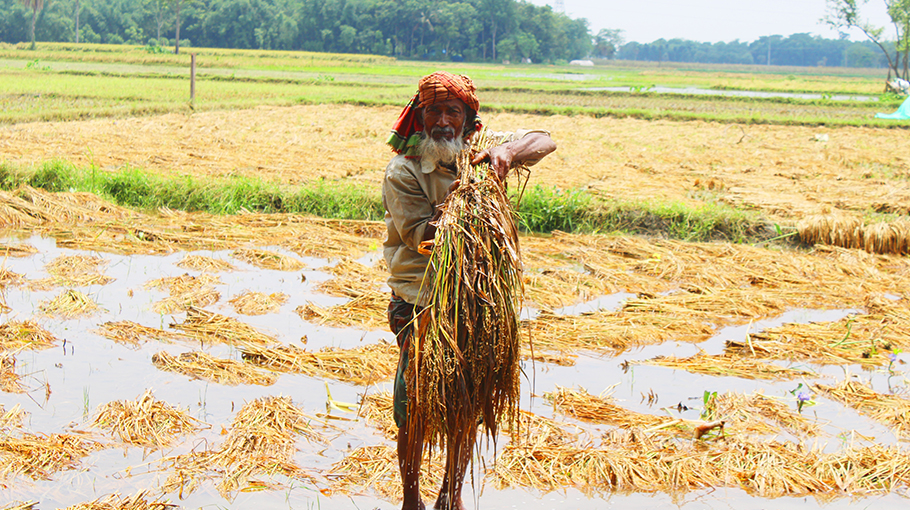Paddy plants rotting under water in Chuadanga
Crunch in cattle feed feared


Boro paddy of many farmers has been submerged after heavy rainfall in Chuadanga due to cyclone Ashani. Although the farmers were able to save the paddy after the continuous rains, it was not possible to save the paddy straw due to the rains. Straw, the main food of cattle, has becoming to rot in the field. Farmers said they were busy storing paddy in the past due to unfavorable weather conditions. So They could not pay much attention to the straw. Due to this, the farmers do not have stocks of cattle feed. As a result, cattle breeders think that there may be a crisis in the area in the next 1-2 months. Farmers are extremely worried about the supply of food for these livestock. The livestock department also fears that the farmers may not be able to conserve hay, which could lead to a food crisis in the area in the future.
Almost every household in the remote rural areas of Chuadanga has 2 to 3 cows of local and foreign breeds. There is no house without cows and calves. Besides, there are about seven hundred small and big cattle farms in the district. And on the occasion of Eid-ul-Adha, traders along with seasonal farmers also keep cows. These cattle are raised in open fields and fed grass. In this way, the farmers fatten the dairy cows and bulls. But a few days ago, the field was submerged due to heavy rains. As a result, there is shortage of food for cattle. Besides, the price of Napier grass and the price of cattle feed has also gone up. Due to this, the owners of domestic animals are in extreme distress. They are worried about saving their cows. Some are also deciding to sell the cows at a lower price as they have failed to supply the cows with food. This will cause loss to the cow keepers.
Chuadanga Sadar Upazila, Alamdanga Upazila, Damurhuda Upazila and various villages of Jivannagar Upazila were visited and same scenario were seen everywhere.
Hamidul Islam, a farmer and cattle breeder from Jayrampur village in Damurhuda upazila, said it has been raining since the start of the paddy harvesting season.
As a result, water has accumulated in the paddy field. Farmers are busy to bring paddy home. So they could not pay attention to the straw. He said the farmers used to dry the straw in the paddy fields. But since there is water in the field, there is no situation like drying straw. If the straw was dried in the sun as soon as the paddy was harvested, it would dry in a day or two. Later they were stored as cow-food. Those who had cows fed them to their cows and those who did not have cows could sell them.
Minarul Haque, a farmer from Loknathpur village, said he used to cultivate paddy himself and the straw he got was enough to feed the cows for several months. Then he buys hay from the farmers and saves it. But this time the straw of the farmers has rotted in the field. The farmers have to struggle to get the paddy in the house. Due to unfavorable weather conditions, straw has been left in the field. The impact of the straw crisis will also fall on Eid-ul-Adha.



